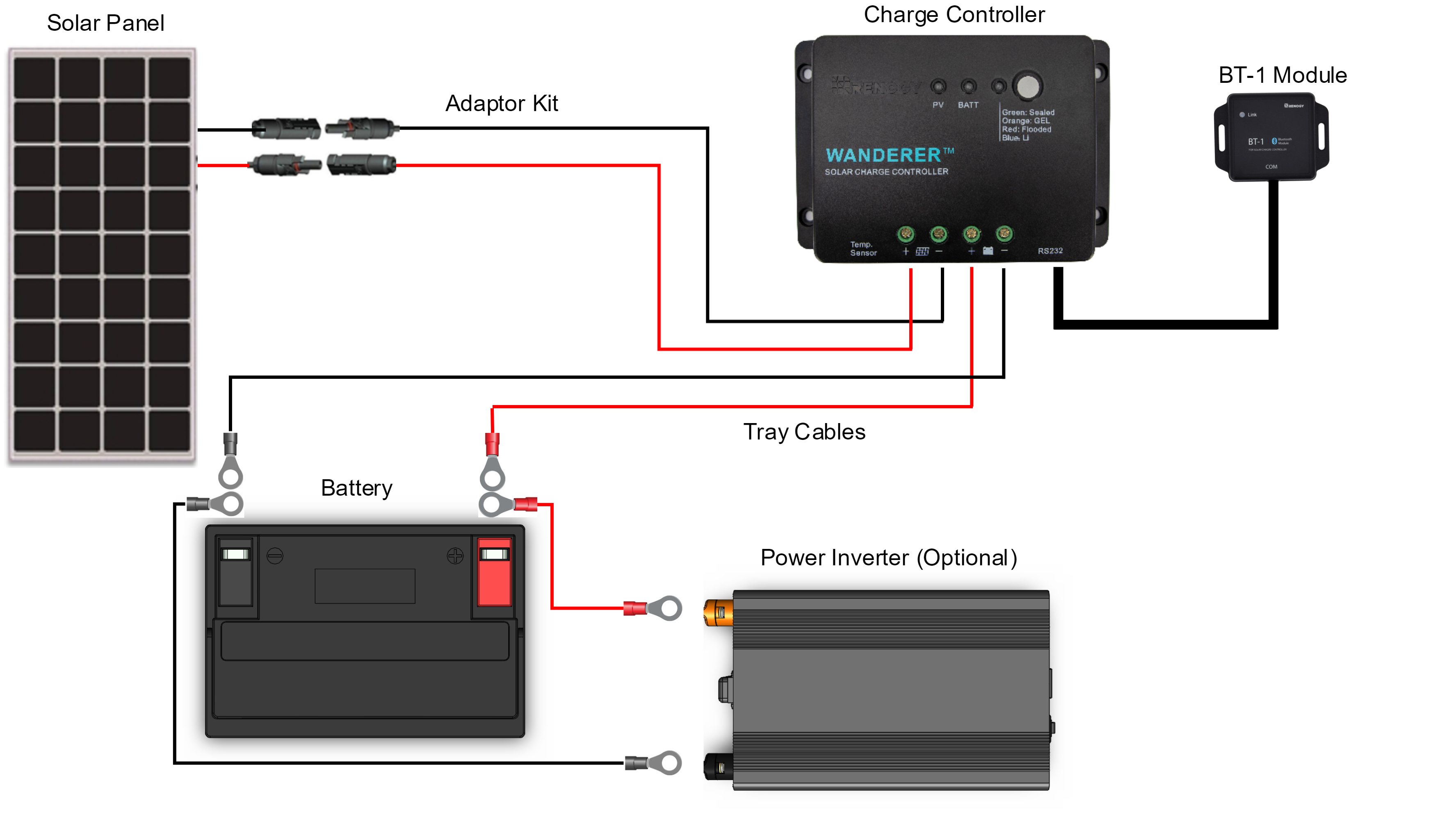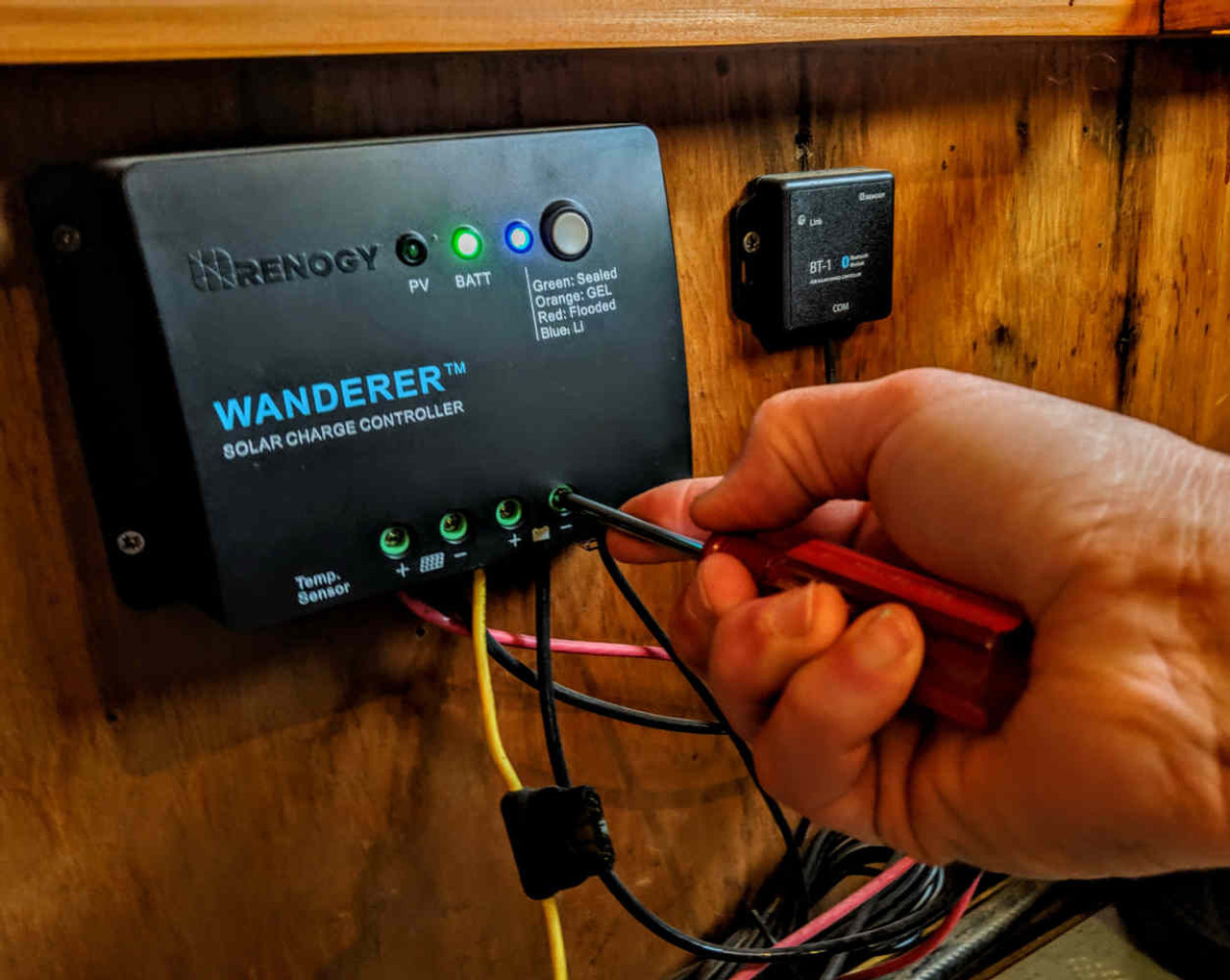10 Questions to Ask Yourself Before Doing Your Own Solar Installation

Before we started our tiny trailer rebuild, we knew we wanted to go solar, but we had no idea where to begin. It was 2011, and the resources available for anyone wanting to do their own solar installation were written by and for people with an Engineering degree. I had a degree in English, my wife in Marketing, and we were both educators for many years.
But we had friends, friends with knowledge of such things, and friends like these are great at freely sharing their expertise, especially when you are doing most of the work and buying all of the beer.We also had some experience. Not any experience with solar, mind you, but we were homeowners who eagerly moved in without the slightest knowledge of electrical, plumbing, roofing, or how to hang and finish drywall. What we lacked in experience, we made up in enthusiasm. Our first project was small, but built confidence – swapping out the old dial thermostat for one that we could program. The next morning, before waking, the furnace kicked on warming the house up for our morning ritual, and we were hooked. Next, we installed a garbage disposal on the kitchen sink, then 3-way light switches, and soon we were sweating copper pipes, and ripping out the plastic tub in the master bathroom to do our own custom tile work. We made some mistakes along the way, but learned from them. If our 10 years of tinkering with the various systems of our house taught us anything, it was that we could learn. What at first seemed overwhelming and scary could be broken down into a manageable first step that built confidence for the next one.
Are YOU ready to DIY Solar?
The following quiz should help you determine if you have the skill set, attitude, free time, and patience to complete your own solar install – or if you’d be better off hiring a professional. Answer Yes, Maybe, or No to the following questions and we’ll reveal whether you should pick-up your tool box or pick-up your phone.

1.
Will the solar installation be off-grid?
Yes? You can do it. No?
You can do some of it. Remember,
installing solar panels on your house and connecting to the electrical grid
must be completed by a licensed electrician and requires a permit.
Off-grid solar installations either on a small
house or RV do not have these restrictions and associated costs.
2.
Do you have the free time?
Everyone’s DIY solar project is different. Some can be done in a weekend afternoon; others might take a month of Sundays. Understanding the complexity of your install is the first step in deciding if it’s the best use of your time. Your ability to do the install won’t help if it means that you miss out on your kid’s swim meet, or delay summer vacation because the rig is torn up mid-project. Being realistic about how much time you have to dedicate to learning, planning, selecting, and installing solar equipment is the first step in deciding whether or not to do this yourself. The follow up questions are: how much do you value your free time? And will you save money in the long run?

3.
Do you have the space to work on your project?
Some municipalities and sub-divisions
have rules about parking an RV, van, or other rolling home in the driveway or
along the streets where you live. This
might limit, and further complicate your plans to DIY, especially if you have
to bring all of your tools, equipment, etc. to another location just to do the
work. We met a fellow vintage RV
enthusiast from the Seattle area who had to remove the axle from his trailer in
order to push it into his garage so that he could work on it at home. That was a commitment to DIY!
4.
Do you intend to live off-grid for at least 3-months out of each
year?
If you plan to live full-time or at least seasonally with your solar installation then you will likely save money over the long run by knowing how to troubleshoot and repair your system by yourself. However, hiring a professional is no guarantee of a problem-free installation. If you plan to just use it for the occasional get-away weekend or short vacation, you might be better off hiring out.

5.
Are you willing to do some research on solar power?While you don’t need to enroll in
an Engineering program to install solar, it’s still a good idea to
familiarize yourself with how solar works, even
if you’re going to hire out some or all of the project. One of our friends who hired a professional
wished that she’d known more about solar before the installation. She realized that she didn’t know enough to
ask the right questions for how things would be installed. They ended up with a pretty powerful system,
but the only outlet connected to the inverter was a long way from the kitchen
where they needed the majority of the power.
Fortunately, they were able to fix this without re-consulting with their
professional installer. But, had they
done more research before the job they could have avoided the issue all
together.

6.
Do you own or have the ability to borrow, purchase, or barter for
the following
7 tools?
1.Screwdriver
2.Wire Cutter / Stripper / Crimper
3.Pliers
4.Crescent Wrench
5.Power Drill
6.Measuring Tape
7.Voltage Meter
The tools needed for a solar install are fairly simple; though the more complex the build, the more specific the tool requirement. Purchasing tools contribute to your budget, so keep that in mind.

7.
Do you have, or can you make, friends with mad skills?
Doing it yourself doesn’t mean you
have to do it
all by yourself. During
our install, we consulted our friends at
IONCON of Boone, NC. We happen to be tight with the owner. One of his engineers walked us through nearly
every step of the way, including the ridiculously complex wiring diagram for
our voltage meter. These days measuring
voltage is included in most charge controllers – wish we’d had that option back
in 2011.
Other friends we know who put solar on their rigs
had help from friends, or paid someone to draw up the wiring plan and
consult. Others had their work inspected
by a professional before throwing the main breaker. There are many ways to do this, and you can
save money by doing the parts you feel most comfortable with, and leaving other
parts to the professionals.
8.
Do you understand the fundamental difference between DC and AC
power?
Solar installations provide Direct
Current, and the power we use in the standard home is Alternating Current. Learn more about these
two types of power. The way electrical is installed in a home
differs slightly than in an RV or off-grid home.

9.
Can you follow a basic wiring diagram?
Many solar products companies,
including Renogy, assume that customers will do the installation
themselves. Both instructions and
diagrams have come a long way to help the lay-person hook up their panels. However, these instructions still require a
basic knowledge of how DC power works and some DIY skills. If you open your instruction manual and
cannot make sense of it, ask questions!
10.
Can you pick up the phone when something goes wrong?
Let’s face it, not everything goes according to plan. Recognizing and admitting when you’re over your head, or might have made a mistake is all part of the learning process. You might find yourself getting stuck in the middle of your install with no idea how to get out if it. You might accidentally connect the positive lead to the negative terminal and fry a diode or fuse in the process. It’s not necessarily the end of your DIY project – asking for help isn’t a sign of weakness, it’s a sign of wisdom. Renogy technicians and engineers are available to assist with problems in setting up their products. Take a deep breath, walk away for a minute, and pick up the phone or send an email – 800-330-8678 or techsupport@renogy.com
Let’s See What Your Responses Are Saying…

Mostly YES Hello Handyperson! You so got this, and will be rewarded with a functioning and efficient solar panel system. You will become an ambassador for solar and help other people break free from their reliance on full-hook ups or noisy generators. Success in one DIY project leads to other projects, just remember not to bite off more than you can chew.
Mostly MAYBE This is the moment of truth, do you or don’t you? Or do you tackle part of the installation yourself and hire a professional to do the rest? You might want to do a bit more research or really break down what your free time is worth. Perhaps start with another project that might give you the confidence for the next step. Just remember, there’s no shame in asking for help or hiring a professional. Though, hiring a professional does not necessarily guarantee a problem-free installation. Do your homework and ask for references before putting down a deposit.
Mostly NO Hey, no shame in honestly recognizing your skillset and available free time. There are many DIYers who have become professionals. More professionals getting work means that the cost of equipment and installation will become less expensive and there will be more solar power out in the world. More solar means less dependency on fossil fuels and a reduction of greenhouse gasses. Just because you don’t think you can do the project yourself shouldn’t deter you from going solar. Remember to check the references of your potential installer.
If we’ve inspired you to go solar with Renogy, please use our affiliate link and promo code “canlife.” You will get a 10% discount and we will get credit for the sale. It’s win-win! And, as always, contact us directly with any questions. We love to hear from our readers!

Shari Galiardi & David Hutchison have turned their higher education backgrounds, desire for life-long learning, and thirst for adventure travel into writing, photography, video production, and public speaking tours from coast to coast. Known to their friends as simply Shari & Hutch, you can learn more about their full-time, solar powered adventures on their website at freedominacan.com. Or, follow them on Facebook, Instagram, and YouTube as “Freedom in a Can.”











